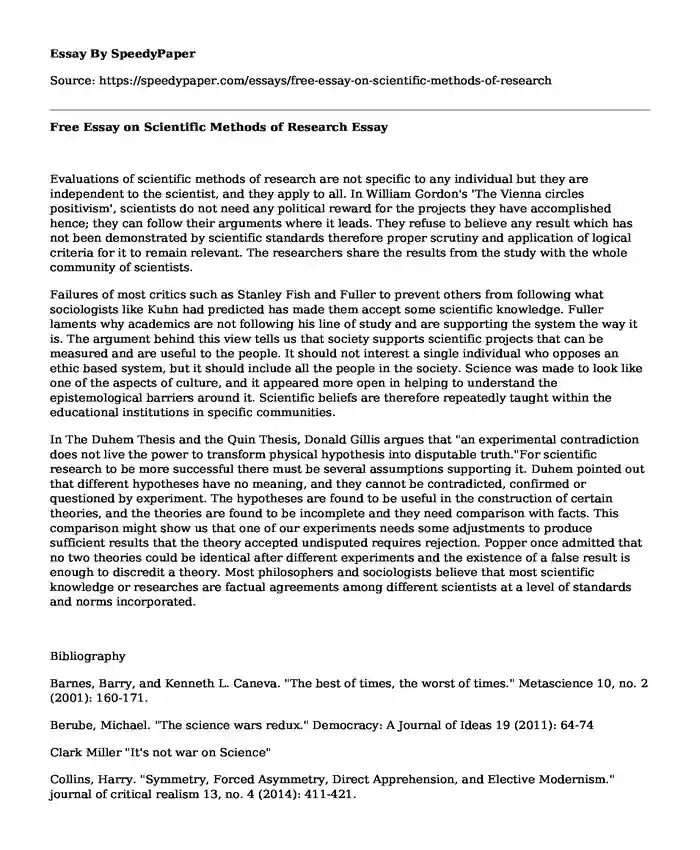Evaluations of scientific methods of research are not specific to any individual but they are independent to the scientist, and they apply to all. In William Gordon's 'The Vienna circles positivism', scientists do not need any political reward for the projects they have accomplished hence; they can follow their arguments where it leads. They refuse to believe any result which has not been demonstrated by scientific standards therefore proper scrutiny and application of logical criteria for it to remain relevant. The researchers share the results from the study with the whole community of scientists.
Failures of most critics such as Stanley Fish and Fuller to prevent others from following what sociologists like Kuhn had predicted has made them accept some scientific knowledge. Fuller laments why academics are not following his line of study and are supporting the system the way it is. The argument behind this view tells us that society supports scientific projects that can be measured and are useful to the people. It should not interest a single individual who opposes an ethic based system, but it should include all the people in the society. Science was made to look like one of the aspects of culture, and it appeared more open in helping to understand the epistemological barriers around it. Scientific beliefs are therefore repeatedly taught within the educational institutions in specific communities.
In The Duhem Thesis and the Quin Thesis, Donald Gillis argues that "an experimental contradiction does not live the power to transform physical hypothesis into disputable truth."For scientific research to be more successful there must be several assumptions supporting it. Duhem pointed out that different hypotheses have no meaning, and they cannot be contradicted, confirmed or questioned by experiment. The hypotheses are found to be useful in the construction of certain theories, and the theories are found to be incomplete and they need comparison with facts. This comparison might show us that one of our experiments needs some adjustments to produce sufficient results that the theory accepted undisputed requires rejection. Popper once admitted that no two theories could be identical after different experiments and the existence of a false result is enough to discredit a theory. Most philosophers and sociologists believe that most scientific knowledge or researches are factual agreements among different scientists at a level of standards and norms incorporated.
Bibliography
Barnes, Barry, and Kenneth L. Caneva. "The best of times, the worst of times." Metascience 10, no. 2 (2001): 160-171.
Berube, Michael. "The science wars redux." Democracy: A Journal of Ideas 19 (2011): 64-74
Clark Miller "It's not war on Science"
Collins, Harry. "Symmetry, Forced Asymmetry, Direct Apprehension, and Elective Modernism." journal of critical realism 13, no. 4 (2014): 411-421.
Darrin Durant. What You Are Calling 'Anti Science'? How Science Serves Social and Political Agendas
Donald Gillis. "The Duhem Thesis and the Quin Thesis"
Fuller, Steve. Kuhn vs. Popper: The struggle for the soul of science. Columbia University Press, 2004.
Hess, David J. "Falsification and Demarcation of the Problem". Class readings
Miller, Clark A. "It's not a war on science." (2017): 26-30.
Pinch, Trevor. "Towards an analysis of scientific observation: The externality and evidential significance of observational reports in physics." Social studies of science 15, no. 1 (1985): 3-36.
Seigio Sigmondo "The Strong Programme and the Sociology of Knowledge" 2010
Cite this page
Free Essay on Scientific Methods of Research. (2022, Apr 12). Retrieved from https://speedypaper.net/essays/free-essay-on-scientific-methods-of-research
Request Removal
If you are the original author of this essay and no longer wish to have it published on the SpeedyPaper website, please click below to request its removal:
- Theory of Knowledge, Free Essay in Philosophy
- Essay Sample with a Big Government Counter Argument
- Free Essay Example on Solar Power Panels
- Free Essay Exploring Job Stress and the Work-Life Balance of Working Women with Families
- Free Essay Example on Sports Fellowship
- Gender and Language, Free Paper with a Research Proposal
- Comparing Int'l & Local Company Strategies for Success
Popular categories





